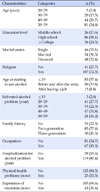Abstract
Purpose
The purpose of this study was to identify the factors affecting social problem-solving ability in alcohol dependent men in outpatient treatment facilities.
Methods
Participants were 148 men dependent on alcohol who were outpatients at 5 hospitals for mentally ill patients in G City. Data were collected from May 1 to June 30, 2016 using self-report questionnaires. Abstinence self-efficacy, existential spiritual well-being, alcohol insight, unconditional self-acceptance, and social problem-solving ability were investigated. For data analysis t-test, one-way ANOVA, Pearson correlation coefficients and multiple regression were employed.
Results
Mean score for social problem-solving ability was 18.28±5.27. Social problem-solving ability had a positive correlation with abstinence self-efficacy, existential spiritual well-being, and unconditional self-acceptance. Factors affecting social problem-solving ability in these men were unconditional self-acceptance, lack of sleep disorder, existential spiritual well-being, and religiousness. The explanatory power was 57%.
Conclusion
In planning an intervention for social problem-solving ability for alcohol dependent men, it is important to employ strategies which provide enhancement of self-acceptance as a healthy countermeasure to the low level of unconditional self-acceptance and to provide educational interventions for physical health or sleep deprivation for the patients with these problems along with low social problem-solving ability.
Figures and Tables
References
1. Jung HO, Chae YS, Kim HS. The influence of self-esteem, trait anger, depression, family function, and interpersonal relations on existential spiritual well-being in patients with alcohol dependence. J Korean Acad Psychiatr Ment Health Nurs. 2015; 24(1):50–60. DOI: 10.12934/jkpmhn.2015.24.1.50.

2. Park HN, Yu SJ. Effects of meditation training program on self concept, abstinence self-efficacy, and abstinence in alcoholic patients. J Korean Acad Psychiatr Ment Health Nurs. 2005; 14(3):304–312.
3. Maydeu-Olivares A, D'Zurilla TJ. A factor-analytic study of the social problem-solving inventory: an integration of theory and data. Cognit Ther Res. 1996; 20(2):115–133.

4. Choi YS. A study of the reliability and validity of the social problem solving inventory-revised (SPSI-R). Korean J Clin Psychol. 2002; 21(20):413–428.
5. Choi YS. Deficit of social problem-solving for alcoholics. Korean J Clin Psychol. 2003; 22(4):927–934.
6. Choi YS. Efficacy of social problem-solving training program for alcoholics. Korean J Clin Psychol. 2005; 8:475–493.
7. Moon JY, Kwon YH. The effect of music therapy improvisation based on the cognitive behavior approach on social problem solving ability and abstinence self-efficacy of the alcoholic patients. J Korean Alcohol Sci. 2009; 10(1):107–118.
8. Yang SH, Yoon JW. Effects of depression, anxiety, and alcohol abstinence self-efficacy on drinking problem among college students: health and welfare department students. J Korea Contents Assoc. 2015; 15(12):304–313. DOI: 10.5392/JKCA2015.15.12.304.

9. Seong SG, Lee JJ, Kim HO, Lee GH. The study of effect of alcoholism hospitalization treatment program. Addict Ment Med Sci. 2002; 6(1):20–29.
10. Flett GL, Besser A, Davis RA, Hewitt PL. Dimensions of perfectionism, unconditional self-acceptance, and depression. J Ration Emot Cogn Behav Ther. 2003; 21(2):119–138.
11. Yang JN, Choi EJ, Park SH, Jang GH. Effect of social support in mental health among A.A. members: mediating effects of alcohol insight and spirituality. J Korean Alcohol Sci. 2013; 14(2):65–79.
12. Heo K. Development and evaluation of the effectiveness of the integrated program for the recovery of alcoholics. Church Soc Work. 2012; 19:39–71.
13. Jung HO, Chae YS, Kim HS. The influence of self-esteem, trait anger, depression, family function, and interpersonal relations on existential spiritual well-being in patients with alcohol dependence. J Korean Acad Psychiatr Ment Health Nurs. 2015; 24(1):50–60. DOI: 10.12934/jkpmhn.2015.24.1.50.

14. Ramadan R, Mcmurran M. Alcohol and aggression: Gender differences in their relationships with impulsiveness, sensation seeking and social problem solving. J Subst Use. 2005; 10(4):215–224.

15. DiClemente CC, Carbonari JP, Montgomery RP, Hughes SO. The alcohol abstinence self-efficacy scale. J Stud Alcohol. 1994; 55(2):141–148. DOI: 10.15288/jsa.1994.55.141.

16. Kim SJ. Modeling relapse of alcoholism. [dissertation]. [Seoul]: Seoul National University;1996. 141.
17. Paloutzian RF, Ellison CW. Loneliness, spiritual wellbeing and quality of life. In : Peplau LA, Perlman D, editors. Loneliness: a source book of current theory, research, and therapy. New York: Wiley;p. 237.
18. Lee JH. A validation study of spiritual well-Being scale. [master's thesis]. [Seoul]: Sookmyung Women's University;2012. 73.
19. Kim JS, Kim GJ, Lee JM, Lee CS, Oh JK. HAIS (Hanil alcohol insight scale): validation of an insight-evaluation instrument for practical use in alcoholism. J Stud Alcohol. 1998; 59(1):52–55. DOI: 10.15288/jsa.1998.59.52.

20. Chamberlain JM, Haaga DAF. Unconditional self-acceptance and psychological health. J Ration Emot Cogn Behav Ther. 2001; 19(3):163–176. DOI: 10.1023/A:1011189416600.
21. Kim SHS. Designing and application of the unconditional self acceptance development program. J Korean Home Manage Assoc. 2005; 23(5):161–170.
22. Lee YH, Park SA. The effect of transactional analysis group program on the motivation for change and strategy for change, abstinence self-efficacy of alcoholics. Korea J Couns. 2008; 9(4):1585–1605.

23. Hyun M, Woo J, Kim H. Insight, self-esteem, and coping skills among patients with alcohol addiction. J Korean Acad Psychiatr Ment Health Nurs. 2013; 22(3):137–146. DOI: 10.12934/jkpmhn.2013.22.3.137.

24. Pajares F, Miller MD. Role of self-efficacy and self-concept beliefs in mathematical problem solving: a path analysis. J Educ Psychol. 1994; 86(2):193–203.

25. Kim EH. Drinking-related insight and characteristics of women with alcohol use disorder. [master's thesis]. [Daejeon]: Eulji University;2007. 56.
26. Davies MF. Irrational beliefs and unconditional self-acceptance. I. Correlational evidence linking two key features of REBT. J Ration Emot Cogn Behav Ther. 2006; 24(2):113–124.

27. Blazer DG, Meador KG. The role of spirituality in health aging. In : Depp CA, Jeste DV, editors. Successful cognitive and emotional aging. Arlington, VA: American Psychiatric Publishing, Inc;2009. p. 441.
28. Carney CE, Waters WF. Effects of a structured problem-solving procedure on pre-sleep cognitive arousal in college students with insomnia. Behav Sleep Med. 2006; 4(1):13–28. DOI: 10.1207/s15402010bsm0401_2.

29. Hong HS, Park JE, Park WJ. Predictors of hospitalization for alcohol use disorder in Korean men. J Korean Acad Nurs. 2014; 44(5):552–562. DOI: 10.4040/jkan.2014.44.5.552.





 PDF
PDF ePub
ePub Citation
Citation Print
Print







 XML Download
XML Download